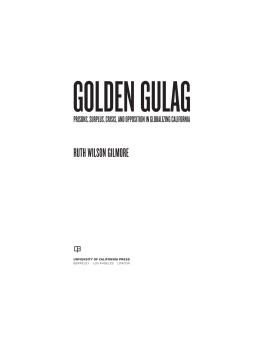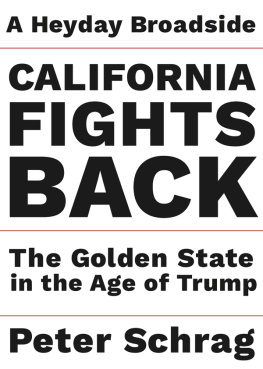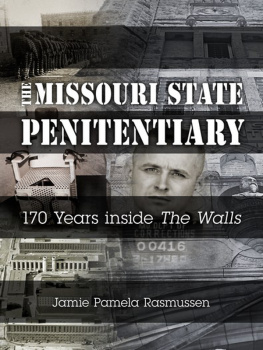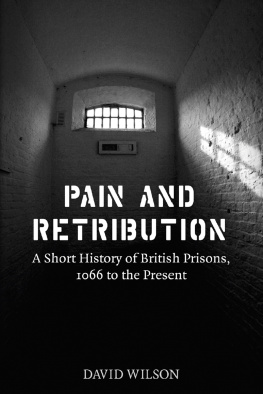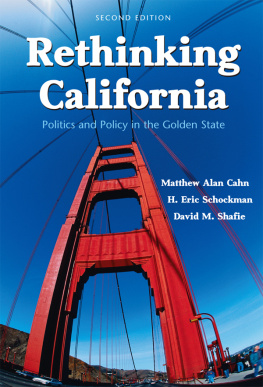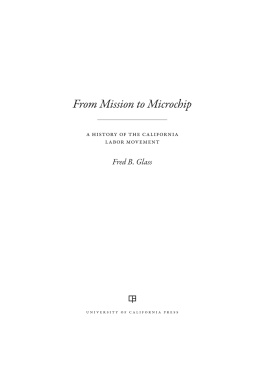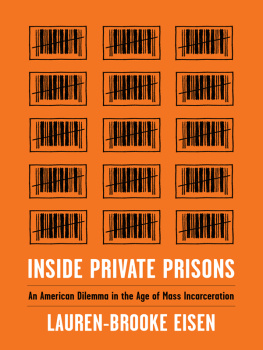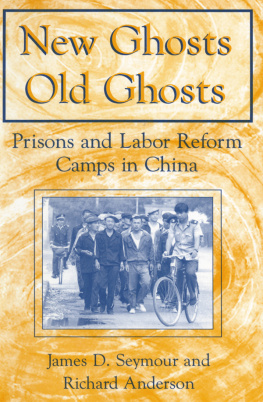
GOLDEN GULAG
AMERICAN CROSSROADS
EDITED BY EARL LEWIS, GEORGE LIPSITZ, PEGGY PASCOE, GEORGE SNCHEZ, AND DANA TAKAGI
GOLDEN GULAG
PRISONS, SURPLUS, CRISIS, AND OPPOSITION IN GLOBALIZING CALIFORNIA
RUTH WILSON GILMORE

UNIVERSITY OF CALIFORNIA PRESS
BERKELEYLOS ANGELESLONDON
University of California Press, one of the most distinguished university presses in the United States, enriches lives around the world by advancing scholarship in the humanities, social sciences, and natural sciences. Its activities are supported by the UC Press Foundation and by philanthropic contributions from individuals and institutions. For more information, visit www.ucpress.edu.
University of California Press
Berkeley and Los Angeles, California
University of California Press, Ltd.
London, England
2007 by
The Regents of the University of California
Library of Congress Cataloging-in-Publication Data
Gilmore, Ruth Wilson, 1950.
Golden gulag : prisons, surplus, crisis, and opposition in globalizing California / Ruth Wilson Gilmore.
p.cm(American crossroads ; 21).
Includes bibliographical references and index.
ISBN -13: 978-0-520-22256-4 (cloth : alk. paper)
ISBN -10: 0-520-22256-3 (cloth : alk. paper)
ISBN -13: 978-0-520-24201-2 (pbk. : alk. paper)
ISBN -10: 0-520-24201-7 (pbk. : alk. paper)
eISBN 9780520938038
1. PrisonsCalifornia.2. PrisonsEconomic aspectsCalifornia.3. ImprisonmentCalifornia.4. Criminal justice, Administration ofCalifornia.5. Discrimination in criminal justice administrationCalifornia.6. MinoritiesCalifornia.7. CaliforniaEconomic conditions.I. Title.II. Series.
HV9475.C2G732007
365.9794dc222006011674
Manufactured in the United States of America
15 14 13 12
11 10 9 8 7 6 5
This book is printed on New Leaf EcoBook 60, containing 60% postconsumer waste, processed chlorine free; 30% de-inked recycled fiber, elemental chlorine free; and 10% FSC-certified virgin fiber, totally chlorine free. EcoBook 60 is acid free and meets the minimum requirements of ANSI/ASTM D 563401 ( Permanence of Paper ).
FOR MY MOTHER, RUTH ISABEL HERB WILSON AND IN LOVING MEMORY OF MY FATHER, COURTLAND SEYMOUR WILSON
CONTENTS
ILLUSTRATIONS
FIGURES
MAP
TABLES
ACKNOWLEDGMENTS
Golden Gulag is a late first booklate in my life, late to the press, and so late in the twentieth century that it appears well into the twenty-first. In some ways, the contents are old news, but alas not old enough to have become mere bad memories or the stuff of history to learn from. Over the years, as Ive wrestled with the questions and evidence that shape the book, Ive had so much help from so many people that this section of the volume should, by rights, be longer than any chapter and contain far more entries than the bibliography. However, well into my second half-century on this troubled planet, Im as forgetful as I am indebtedand hopeful that if you dont find your name here, youll forgive the oversight. And may all, named or not, excuse the errors.
Poor Neil Smith. As Geography Department chair at Rutgers, he generously accepted a cranky middle-aged activist packing a couple of drama degrees and a headful of social theory to be his Ph.D. student and got plenty of drama in return. He also made me think systematically about society and space, accepted my formulation for what happened, why, and to what endand then made me prove it to him, revision after revision, in my dissertation. We fought a lot. We also celebrated often, and Im grateful to Neil and to Cindi Katz for embracing both Gilmores the moment we arrived at New Brunswick, for wining and dining and throwing parties for us for four years, and making me a scholar- activist.
At Rutgers, Professors Leela Fernandes, Dorothy Sue Cobble, Bob Lake, Ann Markusen, Susan Fainstein, John Gillis, and Caridad Souza taught me to work across disciplines; Leela, in particular, models the analytical courage interdisciplinarity demands. I hope Susan will accept this book in lieu of the paper I owe her.
When I headed off to Rutgers, my Los Angeles compaeras especially Theresa Allison, Geri Silva, Pauline Milner, and Donna Warrenin Mothers Reclaiming Our Children wished me well, and they always welcomed me back to the foldexpecting me always to bring useful knowledge and help make their knowledge useful.
A coalition sparked by Mothers ROC and Families to Amend Californias Three Strikes (FACTS) expanded statewide thanks to the relentless energy of Geri Silva, Gail Blackwell, Barbara Brooks, Sue Rheams, Claudia Marriott, Julia Gonzales, Mary Avanti, Doug Kieso, Dennis Duncan, Carmen Ewell, and Christy Johnson, among many other tireless people.
My capacity to think theoretically, but speak practically, I owe to the stern sisterly tutelage of my Wages for Housework mentors, Margaret Prescod and Selma James.
Without Mike Davis there would be no Golden Gulag. He shared ideas, research, and resources, pointed me toward Mothers ROC and Corcoran, asked plenty of great questions, read the manuscript thoroughly, and also showed me the practical connections between analytical, political, and pedagogical creativity. Years ago, when neither of us had a proper job, we shook our graying heads in dismay at a future of endless adjuncting. Now we both have steady jobs; who knew?
George Lipsitz, Dave Roediger, Robin D. G. Kelley, Don Mitchell, Beth Richie, Ed Soja, Audrey Kobayashi, Andrea Smith, Lauren Berlant, Lakshman Yapa, Cindi Katz, Greg Hooks, Amy Kaplan, George Snchez, Chris Newfield, Fred Moten, Devra Weber, Barbara Christian, Bruce Franklin, Angela Y. Davis, Wendy Brown, Cathy Cohen, Judith Butler, Wahneema Lubiano, Steve Martinot, Joy James, Linda Evans, Cheryl Harris, Joan Dayan, Mike Merrill, Paul Gilroy, Vron Ware, Peter Linebaugh, Bobby Wilson, Cedric Robinson, Elizabeth Robinson, Agnes Moreland Jackson, Sue E. Houchins, Deborah Santana (who set me straight on my working title Sunshine Gulag and suggested Golden, lest anyone think the book was about Florida), and, more than anyone, A. Sivanandan and Stuart Hall indelibly influenced how I think: each fiercely demonstrates how learning well is a generous art.
During graduate school, we studentsLaura Liu, Rachel Herzing, John Antranig Kasbarian, Curtis Frietag, Melina Patterson, Lisa Lynch, Alex Weheliye (who made me think about land!), Yong-Sook Lee, Marlen Llanes, Nicole Cousino, and Ralph Saundersformed communities of purpose that still bind us in our commitment to live the change.
Id never have spent a minute, much less six years, at Berkeley were it not for the interventions, encouragement, friendship, and mentoring of Dick Walker, Gill Hart, and Carol Stack. I also had the fortune to share work-in-progress with amazing colleaguesJean Lave, Pedro Noguera, Dan Perlstein, Barrie Thorne, Harley Shaiken, Allan Pred, Evelyn Nakano Glenn, Elaine Kim, Michael Omi, Pat Hilden, Jos David Saldvar, Jeff Romm, John Hurst, Caren Kaplan, and my dearest Cal pal Kurt Cuffey. Delores Dillard, Jahleezah Eskew, Nat Vonnegut, Carol Page, and Dan Plumlee made life easy for the bureaucratically challenged and, along with Don Bain and Darin Jensen, prove that staff are the backbone and conscience of academia.
The students of Carceral Geographies at Berkeley dutifully studied the manuscript and, integrating their readings with ambitious fieldwork, concluded every fall semester with group research projects full of excellent evidence and surprising insights.
Next page
